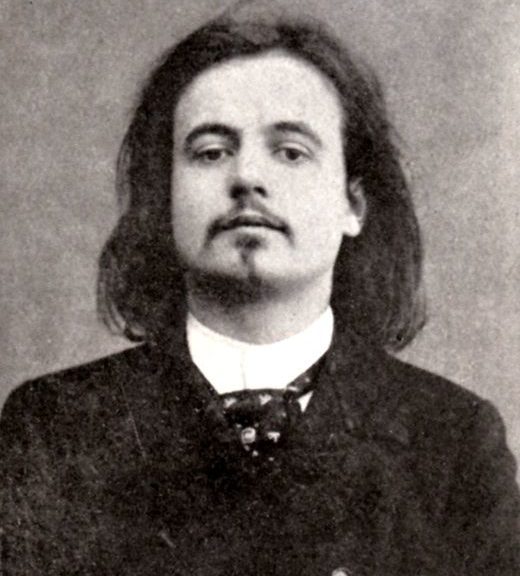ALFRED JARRY, French writer died (b.1873). French writer best known for his play Ubu Roi (1896), which is often cited as a forerunner to the surrealist theater of the 1920s and 1930s, Jarry wrote in a variety of genres and styles. He wrote plays, novels, poetry, essays and speculative journalism. His texts present some pioneering work in the field of absurdist literature.
Sometimes grotesque or misunderstood (i.e. the opening line in his play Ubu Roi, “Merdre!”, has been translated into English as “Shittr!”, “Shikt!”, and “Pschitt!”), he invented a science called ‘pataphysics.’
At 17 Jarry passed his baccalaureat and moved to Paris to prepare for admission to the École Normale Supérieure. Though he was not admitted, he soon gained attention for his original poems and prose-poems. A collection of his work, Les minutes de sable mémorial, was published in 1893. That same year, both his parents died, leaving him a small inheritance which he quickly spent. Jarry had meantime discovered the pleasures of alcohol, which he called “my sacred herb” or, when referring to absinthe, the “green goddess”. A story is told that he once painted his face green and rode through town on his bicycle in its honor (and possibly under its influence).
Drafted into the army in 1894, his gift for turning notions upside down defeated attempts to instill military discipline. The sight of the small man in a uniform much too large for his less than 5-foot frame—the army did not issue uniforms small enough — was so disruptively funny that he was excused from parades and marching drills. Eventually the army discharged him for medical reasons.
Jarry returned to Paris and applied himself to drinking, writing, and the company of friends who appreciated his witty, sweet-tempered, and unpredictable conversation. This period is marked by his intense involvement with Remy de Gourmont in the publication of L’Ymagier, a luxuriously produced “art” magazine devoted to the symbolic analysis of medieval and popular prints. Symbolism as an art movement was in full swing at this time and L’Ymagier provided a nexus for many of its key contributors. Jarry’s play Caesar Antichrist (1895) drew on this movement for material. This is a work that bridges the gap between serious symbolic meaning and the type of critical absurdity with which Jarry would soon become associated. Using the biblical Book of Revelation as a point of departure, Caesar Antichrist presents a parallel world of extreme formal symbolism in which Christ is resurrected not as an agent of spirituality but as agent of the Roman Empire that seeks to dominate spirituality.
The spring of 1896 saw the publication, in Paul Fort’s review Le Livre d’art, of Jarry’s 5-act play Ubu Roi. Ubu Roi’s savage humor and monstrous absurdity, unlike anything thus far performed in French theater, seemed unlikely to ever actually be performed on stage. However, impetuous theater director Aurélien-Marie Lugné-Poe took the risk, producing the play at his Théâtre de l’Oeuvre.
On opening night (December 10, 1896), with traditionalists and the avante-garde in the audience, King Ubu (played by Firmin Gémier) stepped forward and intoned the opening word, “Merdre!” (“Shittr!”). A quarter of an hour of pandemonium ensued: outraged cries, booing, and whistling by the offended parties, countered by cheers and applause by the more forward-thinking contingent. Such interruptions continued through the evening. At the time, only the dress rehearsal and opening night performance were held, and the play was not revived until 1907.
The play brought international fame to the 23-year-old Jarry, and he immersed himself in the fiction he had created. Gémier had modeled his portrayal of Ubu on Jarry’s own staccato, nasal vocal delivery, which emphasized each syllable (even the silent ones). From then on, Jarry would always speak in this style. He adopted Ubu’s ridiculous and pedantic figures of speech; for example, he referred to himself using the royal we, and called the wind “that which blows” and the bicycle he rode everywhere “that which rolls”.
Jarry moved into a flat which the landlord had created through the unusual expedient of subdividing a larger flat by means of a horizontal rather than a vertical partition. The diminutive Jarry could just manage to stand up in the place, but guests had to bend or crouch. Jarry also took to carrying a loaded pistol. In response to a neighbor’s complaint that his target shooting endangered her children, he replied, “If that should ever happen, ma-da-me, we should ourselves be happy to get new ones with you” (though he was not at all inclined to engage with females in the manner implied).
